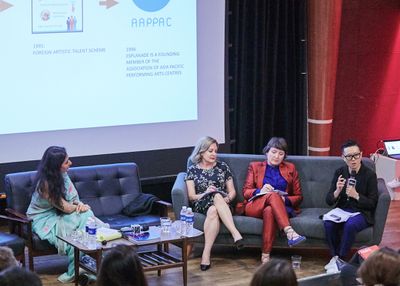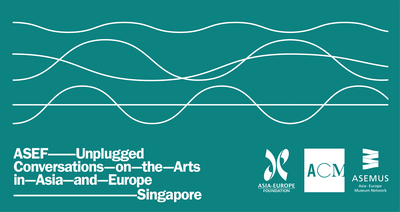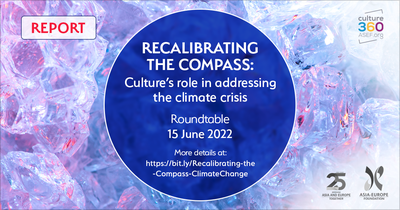Producer Networks: Some Motivations and Themes

Producer networks in the arts may be defined as those groups and platforms that bring together artists, companies and other agents involved in new production. Operating at local, national or international level, producer networks are often ‘independent’ organisations, occupying a middle ground between the public sector and the market, although this remains a very diverse landscape, as are performing arts ecosystems across countries.
In order to further explore the reality and diversity of this sector, the 16th edition of the ASEF Unplugged conversation series will present three examples of producer networks: Artsadmin (UK), Producer Group DOT (Korea), and Producers SG (Singapore). Entitled “Networks of Producing: Possibilities and Pitfalls”, the event will be moderated by Fatima Avila (ASEF) and hosted by Centre 42 in Singapore on 11 May 2019 at 17:00-19:00.
Producer networks may be seen as one type of what the EU-funded SPACE project (2008-11) called ‘intermediary’ culture organisations, highlighting that they have progressively contributed to strengthening the performing arts sector. Research conducted by Cristina Farinha suggested that intermediary organisations fulfilled a number of roles, including those of capacity-building, advocacy, and know-how dissemination, and recommended that the intrinsic role of intermediaries within the artistic process be further recognised.
What are the motivations behind these networks? Despite their diversity, some common features can be identified:
- Enabling encounters: One of the main roles of producer networks is to facilitate mutual knowledge and networking among professionals, and to overcome isolation. Producers.sg, a community network for independent producers, arts managers and self-producing artists in Singapore, has explained that one of its aims is to extend care and support for the emotional wellbeing and creative livelihoods of fellow arts workers. In Aarhus, Denmark, the local Performing Arts Platform hosts a free weekly breakfast which also serves as learning and discussion session.
_ISABAxo.jpg)
Producers SG aims to extend care and support for the emotional wellbeing and creative livelihoods of arts workers
- Fostering learning, capacity-building and knowledge-gathering: As with other similar platforms, one of the roles of producer networks is to provide learning and capacity-building, through either formal (e.g. workshops, courses, mentoring schemes) or informal (e.g. networking events, online groups) means. They may also be in a position to gather and disseminate knowledge in the form of reports and other publications, drawing on the experience of their members.
- Sharing resources: Rehearsal spaces, equipment, props, etc. Networking can enable more efficient use of goods as well as some services, such as administrative support or marketing, enabling individual organisations to reduce costs for relevant aspects of their development.
- Enabling collaboration, risk-taking, and experimentation: Artistic scenes are increasingly hybrid and favour innovation, and networks that bring together artists from different disciplines, such as Korea’s Producer Group DOT, are particularly well-suited to enable cross-disciplinary explorations. The relative stability and security provided by these platforms can also allow risk-taking and experimentation: in Australia, Performing Lines is driven by values of innovation, diversity, inquiry and resonance, and prides itself on its 35-year history of backing artistically challenging and rigorous work.

Korea's Producer Group DOT enables cross-disciplinary explorations in performing arts. Photo from http://producergroupdot.kr/
- Fostering a level playing field: Just as any sector in society, the performing arts may reproduce economic, generational, or geographic imbalances, something that cannot be resolved by individual organisations alone. However, some steps to redress imbalances may be adopted, as proven by the example of Nová Siť, a Czech organisation that develops work in both Prague and the country’s regions, somehow bridging gaps and fostering collaboration.
- Raising the sector’s voice: Advocacy is a significant driver in many networking initiatives, as exemplified by Artsadmin’s engagement in a wide range of campaigns on issues including strengthening the role of culture in society, supporting international mobility, creating an oil-free cultural sector, and addressing climate change. In Catalonia, Spain, el Col·lectiu is a platform of independent theatre companies that works towards better legislation and funding for the performing arts.
- Enhancing sustainability: An analysis of the dance sector in Nordic and Baltic countries conducted in 2015 found that developing support systems, in the form of arts communities and intermediaries, was one step towards enhancing sustainability. This could also apply in other sectors and countries – collaboration contributes to strengthening the sector, hopefully making it more resilient to turbulent times.

Artsadmin engages in a wide range of campaigns on issues including climate change. Photo of Artsadmin studio from https://www.artsadmin.co.uk
Of course, producer networks also need to face a set of challenges and consider long-term development issues. Among those that could be discussed on the occasion of ASEF Unplugged-Singapore-Centre42 are the following:
- Funding: As a process, networking may not always lead to very tangible results, at least in the short term, something which may complicate the stable receipt of public and private funding. When coupled with the modest resources of many network members, this can become an obstacle to sustainability and demands well-thought, sophisticated business models.
- A collaborative culture: Networks involve stressing the value added of collaboration, yet they do so by bringing together agents that may also compete for limited resources – how to balance both?
- Working across the value chain: Producer networks place emphasis on the development of new creation and production, but also need to address distribution and access to ensure balanced, healthy ecosystems. Are festivals, venues and audiences open and receptive to the work of independent producer networks? What steps can be taken in this respect? Are alternative outlets needed? As an example, sustainable arts ecosystems and independent festivals were two of the issues discussed at the 5th Asian Producers’ Platform CAMP, held in Indonesia in 2018.
- Balancing internal consistency and members’ autonomy: To what extent should producer networks be guided by a specific aesthetic or artistic drive? Is this an advantage, or can it be detrimental to members’ autonomy and experimentation?
- Governance: As in other organisations, issues of internal participation and transparency are also important in producer networks. Japan’s ON-PAM defines itself as an ‘open network’ which connects its members in a horizontal, non-hierarchical way. What are the advantages and inconveniences of different organisational models?
- International relations: Producer networks can enhance the international perspectives of their members, take part in international projects and facilitate connections with broader networks (e.g. IETM, On The Move). What role do international aspects play in the regular activities of producer networks?
ASEF Unplugged-Singapore-Centre42 promises to be an exciting opportunity to share views and experiences and look towards future opportunities for development and collaboration.
This article is published as a pre-event article to ASEF Unplugged-Singapore-Centre42, exploring the possibilities and pitfall of producing networks.
ASEF Unplugged is a new event series of the Asia-Europe Foundation focusing on informal peer-to-peer conversations on arts, culture and heritage. It responds to the growing demand from conference audiences for more interactive formats that allow for greater engagement of participants beyond being mere receivers of information.
To know more about ASEF Unplugged & to keep updated of our upcoming events, please visit: https://asef.live/unplugged
ASEF is publicly funded by over 50 partner countries of the Asia-Europe Meeting (ASEM), an informal political dialogue process. Singapore is an ASEM partner country.
Written by: Jordi Baltà Portolés
About the author:
Jordi Baltà Portolés is the current Editor of the website of ASEMUS (https://asemus.culture360.ASEF.org)
Similar content
posted on
posted on
posted on
posted on



